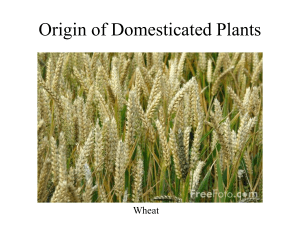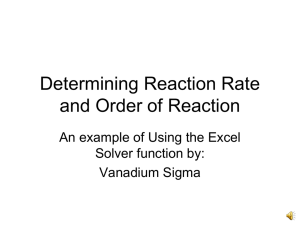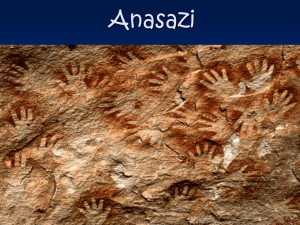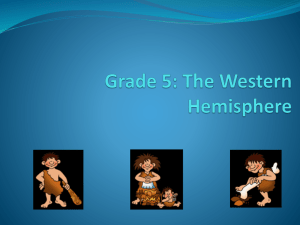pptx - The Trilinos Project
advertisement
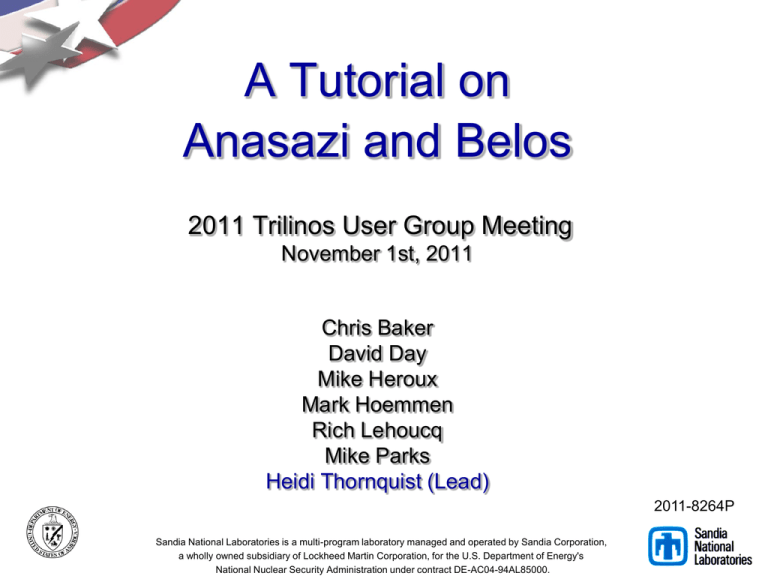
A Tutorial on
Anasazi and Belos
2011 Trilinos User Group Meeting
November 1st, 2011
Chris Baker
David Day
Mike Heroux
Mark Hoemmen
Rich Lehoucq
Mike Parks
Heidi Thornquist (Lead)
2011-8264P
Sandia National Laboratories is a multi-program laboratory managed and operated by Sandia Corporation,
a wholly owned subsidiary of Lockheed Martin Corporation, for the U.S. Department of Energy's
National Nuclear Security Administration under contract DE-AC04-94AL85000.
Outline
Belos and Anasazi Framework
Background / Motivation
Framework overview
Available solver components
Using Anasazi and Belos
Simple examples
Through Stratimikos (Belos)
Through LOCA (Anasazi)
Summary
Background / Motivation
Several iterative linear solver / eigensolver libraries
exist:
PETSc, SLAP, LINSOL, Aztec(OO), …
SLEPc, PRIMME, ARPACK, …
None of the linear solver libraries can efficiently deal
with multiple right-hand sides or sequences of linear
systems
Stopping criteria are predetermined for most libraries
The underlying linear algebra is static
AztecOO
A C++ wrapper around Aztec library written in C
Algorithms: GMRES, CG, CGS, BiCGSTAB, TFQMR
Offers status testing capabilities
Output verbosity level can be determined by user
Interface requires Epetra objects
Double-precision arithmetic
Interface to matrix-vector product is defined by the user
through the Epetra_Operator
ARnoldi PACKage
(ARPACK)
Written in Fortran 77
Algorithms: Implicitly Restarted Arnoldi/Lanczos
Static convergence tests
Output formatting, verbosity level is determined by
user
Uses LAPACK/BLAS to perform underlying vector
space operations
Offers abstract interface to matrix-vector products
through reverse communication
Scalable Library for Eigenvalue Problem
Computations (SLEPc)
Written in C (Campos, Román, Romero, and Thomás, 2011).
Provides some basic eigensolvers as well as wrappers around:
– ARPACK (Lehoucq, Maschhoff, Sorensen, and Yang, 1998)
– PRIMME (Stathopoulos, 2006)
– BLOPEX (Knyazev, 2007)
– BLZPACK (Marques, 1995)
– TRLAN (Wu and Simon, 2001)
Native Algorithms: Power/Subspace Iteration, RQI, Arnoldi, KS
Wrapped Algorithms: IRAM/IRLM (ARPACK), Block Lanczos
(BLZPACK), LOBPCG (BLOPEX), and Lanczos (TRLAN)
Static convergence tests
Uses PETSc to perform underlying vector space operations, matrixvector products, and linear solves
Allows the creation / registration of new matrix-vector products
Anasazi and Belos
Next generation linear solver (Belos) and eigensolver (Anasazi)
libraries, written in templated C++.
Iterative methods for solving sparse, matrix-free systems
Provide a generic interface to a collection of algorithms for solving
linear problems and eigenproblems.
Algorithms developed with generic programming techniques.
Algorithmic components:
• Ease the implementation of complex algorithms
Operator/MultiVector interface (and Teuchos::ScalarTraits):
• Allow the user to leverage their existing software investment
• Multi-precision solver capability
Design offers: Interoperability, extensibility, and reusability
Includes block linear solvers and eigensolvers.
Why are Block Solvers Useful?
In general, block solvers enable the use of faster computational
kernels.
Block Eigensolvers ( Op(A)X = X ):
Reliably determine multiple and/or clustered eigenvalues.
Example applications:
Stability analysis / Modal analysis
Bifurcation analysis (LOCA)
Block Linear Solvers ( Op(A)X = B ):
Useful for when multiple solutions are required for the same system
of equations.
Example applications:
Perturbation analysis
Optimization problems
Single right-hand sides where A has a handful of small eigenvalues
Inner-iteration of block eigensolvers
Belos Solver Categories
Belos provides solvers for:
Single RHS: Ax = b
Multiple RHS (available simultaneously): AX = B
Multiple RHS (available sequentially): Axi = bi , i=1,…,k
Sequential Linear systems: Aixi = bi , i=1,…,k
Linear Least Squares: min || Ax – b ||2
Leverage research advances of solver community:
Block methods: block GMRES [Vital], block CG/BICG [O’Leary]
“Seed” solvers: hybrid GMRES [Nachtigal, et al.]
“Recycling” solvers for sequences of linear systems [Parks, et al.]
Restarting, orthogonalization techniques
Belos Solvers
Hermitian Systems (A = AH)
CG / Block CG
Pseudo-Block CG (Perform single-vector algorithm simultaneously)
RCG (Recycling Conjugate Gradients)
PCPG (Projected CG)
MINRES
Non-Hermitian System (A ≠ AH)
Block GMRES
Pseudo-Block GMRES (Perform single-vector algorithm simultaneously)
Block FGMRES (Variable preconditioner)
Hybrid GMRES
TFQMR
GCRODR / Block GCRODR (Recycling GMRES)
Linear Least Squares
LSQR
Anasazi Categories & Solvers
Anasazi provides solvers for:
Standard eigenvalue problems: AX = X
Generalized eigenvalue problems: AX = BX
Hermitian Eigenproblems
Block Davidson
Locally-Optimal Block Preconditioned Conjugate Gradient (LOBPCG)
Implicit Riemannian Trust-Region (IRTR)
Non-Hermitian Eigenproblems
Block Krylov-Schur (BKS)
Anasazi and Belos
(Framework Overview)
GMRES Example
Anasazi and Belos
(Framework Overview)
Multivector
Classes
GMRES Example
Anasazi and Belos
(Framework Overview)
Problem Classes / Operator Classes
Multivector
Classes
GMRES Example
Anasazi and Belos
(Framework Overview)
Problem Classes / Operator Classes
Multivector
Classes
[Mat]OrthoMan
ager
Class
(ICGS, IMGS,
DGKS, SVQB,
TSQR)
GMRES Example
Anasazi and Belos
(Framework Overview)
Problem Classes / Operator Classes
Multivector
Classes
[Mat]OrthoMan
ager
Class
(ICGS, IMGS,
DGKS, SVQB,
TSQR)
StatusTest
Class
GMRES Example
Anasazi and Belos
(Framework Overview)
Problem Classes / Operator Classes
Multivector
Classes
Iteration
Class
[Mat]OrthoMan
ager
Class
(ICGS, IMGS,
DGKS, SVQB,
TSQR)
StatusTest
Class
GMRES Example
Anasazi and Belos
SolverManager Class
(Framework Overview)
Problem Classes / Operator Classes
Multivector
Classes
Iteration
Class
[Mat]OrthoMan
ager
Class
(ICGS, IMGS,
DGKS, SVQB,
TSQR)
StatusTest
Class
GMRES Example
Anasazi and Belos
SolverManager Class
(Framework Overview)
Problem Classes / Operator Classes
Multivector
Classes
Iteration
Class
[Mat]OrthoMan
ager
Class
(ICGS, IMGS,
DGKS, SVQB,
TSQR)
StatusTest
Class
OutputManager
Class
SortManager
Class
Available Solver Components
SNAUPD, DNAUPD, CNAUPD, and ZNAUPD for solving non-Hermit ian e
Separat e subrout ines are required for each of t he four FORT RAN 77
types (single and double precision real, and single and double precis
Moreover, four addit ional subrout ines are needed for a dist ribut ed m
ment at ion. By t emplat ing abst ract numerical int erfaces on operat or
and scalar types, it is only necessary t o maint ain a single code usin
framework.
Linear Algebra Interface
MultiVecTraits
Abstract interface to define the linear algebra required by most
iterative solvers:
•
•
•
•
creational methods
dot products, norms
update methods
initialize / randomize
OperatorTraits
Abstract interface to enable the
Fig. 1. A n eigensolver
t emplat ed on scalar (ST ), mult ivect or (M V ), and opera
application of an operator
to a multivector.
Allows user to leverage existing linear algebra software investment.
Anot her aspect of software reuse t hat t emplat ing alleviat es is t hr
Implementations
arat ion of t he eigensolver algorit hm from t he linear algebra dat a st r
• MultiVecTraits<double,Epetra_MultiVector>
separat ion, as shown in Figure 3.1, allows a user of t he Anasazi frame
age any exist ing linear algebra software invest
• MultiVecTraits<ST,Thyra::MultiVectorBase<ST>
> ment . All t hat is r
t emplat e inst ant iat ion of t he t rait classes, Mul t i VecTr ai>t s and Ope
• MultiVecTraits<ST,Tpetra::MultiVector<ST,LO,GO,Node>
for t he user-defined mult ivect or and operat or, respect ively. T he S
class and respect ive t emplat e inst ant iat ions for different scalar type
Anasazi Eigenproblem Interface
Provides an interface between the basic iterations and the
eigenproblem to be solved.
Abstract base class Anasazi::Eigenproblem
Allows spectral transformations to be removed from the algorithm.
Differentiates between standard and generalized eigenproblems.
Stores number of requested eigenvalues, symmetry, initial vector,
auxiliary vectors, stiffness/mass matrix, operator, and eigensolution.
Evecs, Evals, Espace, index, numVecs
Concrete class Anasazi::BasicEigenproblem
Describes standard or general, Hermitian or non-Hermitian
eigenproblems.
Belos LinearProblem Interface
Provides an interface between the basic iterations and the linear
problem to be solved.
Templated class Belos::LinearProblem<ST,MV,OP>
Allows preconditioning to be removed from the algorithm.
Behavior defined through traits mechanisms.
Methods:
•
•
•
•
•
•
setOperator(…) / getOperator()
setLHS(…) / getLHS()
setRHS(…) / getRHS()
setLeftPrec(…) / getLeftPrec() / isLeftPrec()
setRightPrec(…) / getRightPrec() / isRightPrec()
apply(…) / applyOp(…) / applyLeftPrec(…) /
applyRightPrec(…)
• setHermitian(…) / isHermitian()
• setProblem(…)
Orthogonalization Manager
Abstract interface to orthogonalization / orthonormalization routines
for multivectors.
Abstract base class [Anasazi/Belos]::[Mat]OrthoManager
void innerProd(…) const;
void norm(…) const;
void project(…) const;
int normalize(…) const;
int projectAndNormalize(…) const;
magnitudeType orthogError(…) const;
magnitudeType orthonormError(…) const;
Concrete classes:
Anasazi::
BasicOrthoManager
ICGSOrthoManager
SVQBOrthoManager
Belos::
DGKSOrthoManager
ICGSOrthoManager
IMGSOrthoManager
TSQROrthoManager*
StatusTest Interface
Informs solver iterate of change in state, as defined by user.
Similar to NOX / AztecOO.
Multiple criterion can be logically connected using StatusTestCombo
Abstract base class [Anasazi/Belos]::StatusTest
StatusType checkStatus( Iteration<…>* solver );
StatusType getStatus() const;
void clearStatus();
void reset();
ostream& print( ostream& os, int indent = 0 ) const;
StatusType: Passed, Failed, Undefined
Iteration proceeds until StatusTest returns Passed
Concrete classes:
Anasazi::
StatusTestMaxIters
StatusTestResNorm
StatusTestOrderedResNorm
StatusTestOutput
Belos::
StatusTestMaxIters
StatusTest[Imp/Gen]ResNorm
StatusTestResNormOutput
StatusTestGeneralOutput
Output Manager Interface
Templated class that enables control of the linear solver output.
Behavior defined through traits mechanism
OutputManager<ST>
Get/Set Methods:
• void setVerbosity( int vbLevel );
• int getVerbosity( );
• ostream& stream( MsgType type );
Query Methods:
• bool isVerbosity( MsgType type );
Print Methods:
• void print( MsgType type, const string output );
Message Types:
• Errors, Warnings, IterationDetails, OrthoDetails,
FinalSummary, TimingDetails, StatusTestDetails,
Debug
Default is lowest verbosity (Errors), output on one processor.
Anasazi Sort Manager
Abstract interface for managing the sorting of the eigenvalues
computed by the eigensolver.
Important tool to complement spectral transformations.
Only two methods:
ReturnType sort(Eigensolver<ST,MV,OP>* solver,
int n, ST *evals,
std::vector<int> *perm=0);
ReturnType sort(Eigensolver<ST,MV,OP>* solver,
int n, ST *r_evals, ST *i_evals,
std::vector<int> *perm=0);
Concrete class Anasazi::BasicSort
Provides basic sorting methods:
• largest/smallest magnitude
• largest/smallest real part
• largest/smallest imaginary part
Anasazi Eigensolver Interface
Provides an abstract interface to Anasazi basic iterations.
Abstract base class Anasazi::Eigensolver
get / reset number of iterations
native residuals
current / maximum subspace size
set / get auxiliary vectors
eigenproblem
initialize / iterate
Concrete solvers (iterations):
Anasazi::BlockKrylovSchur
Anasazi::BlockDavidson
Anasazi::LOBPCG
Anasazi::IRTR
Anasazi Eigensolver Manager
Provides an abstract interface to Anasazi solver managers
(solver strategies)
Abstract base class Anasazi::SolverManager
Access to the eigenproblem
Solve the eigenproblem
Solvers are parameter list driven, take two arguments:
Anasazi::Eigenproblem
Teuchos::ParameterList
Concrete solver managers:
Anasazi::BlockKrylovSchurSolMgr
Anasazi::BlockDavidsonSolMgr
Anasazi::LOBPCGSolMgr
Anasazi::IRTRSolMgr
Belos Iteration Interface
Provides an abstract interface to Belos basic iteration kernels.
Abstract base class Belos::Iteration<ST,MV,OP>
int getNumIters() const; void resetNumIters(int iter);
Teuchos::RCP<const MV> getNativeResiduals( … ) const;
Teuchos::RCP<const MV> getCurrentUpdate() const;
int getBlockSize() const; void setBlockSize(int blockSize);
const LinearProblem<ST,MV,OP>& getProblem() const;
void iterate(); void initialize();
Iterations require these classes:
Belos::LinearProblem, Belos::OutputManager,
Belos::StatusTest, Belos::OrthoManager
Implementations:
Belos::BlockGmresIter
Belos::BlockFGmresIter
Belos::PseudoBlock[CG/Gmres]Iter
Belos::[Block]GCRODRIter
Belos::[CG/BlockCG]Iter,
Belos::RCGIter
Belos::PCPGIter
Belos::TFQMRIter
Belos::LSQRIter
Belos::MinresIter
Belos Solver Manager
Provides an abstract interface to Belos solver managers (solver strategies)
Abstract base class Belos::SolverManager
void setProblem(…); void setParameters(…);
const Belos::LinearProblem<ST,MV,OP>& getProblem() const;
Teuchos::RCP<const Teuchos::ParameterList> getValidParameters() const;
Teuchos::RCP<const Teuchos::ParameterList> getCurrentParameters() const;
Belos::ReturnType solve();
int getNumIters();
Solvers are parameter list driven, take two arguments:
Belos::LinearProblem
Teuchos::ParameterList [validated]
Implementations:
Belos::BlockGmresSolMgr
Belos::PseudoBlock[CG/Gmres]SolMgr
Belos::[Block]GCRODRSolMgr
Belos::BlockCGSolMgr
Belos::RCGSolMgr
Belos::PCPGSolMgr
Belos::TFQMRSolMgr
Belos::LSQRSolMgr
Belos::MinresSolMgr
Simple Examples
Anasazi Eigensolver Example
(Construct the eigenproblem)
// Create eigenproblem
const int nev = 5;
RefCountPtr<Anasazi::BasicEigenproblem<ScalarType,MV,OP> > problem =
Teuchos::rcp( new Anasazi::BasicEigenproblem<ScalarType,MV,OP>(K,M,ivec) );
//
// Inform the eigenproblem that it is Hermitian
problem->setHermitian(true);
//
// Set the number of eigenvalues requested
problem->setNEV( nev );
//
// Inform the eigenproblem that you are done passing it information
bool ret = problem->setProblem();
if (boolret != true) {
// Anasazi::BasicEigenproblem::SetProblem() returned with error!!!
…
}
Anasazi Eigensolver Example
(Construct and run the eigensolver)
// Create parameter list to pass into the solver manager
Teuchos::ParameterList MyPL;
MyPL.set( "Verbosity", Anasazi::Errors + Anasazi::Warnings );
MyPL.set( "Which", "SM" );
MyPL.set( "Block Size", 5 );
MyPL.set( "Num Blocks", 8 );
MyPL.set( "Maximum Restarts", 100 );
MyPL.set( "Convergence Tolerance", 1.0e-6 );
MyPL.set( "Use Locking", true );
MyPL.set( "Locking Tolerance", tol/10 );
//
// Create the solver manager
Anasazi::BlockDavidsonSolMgr<ScalarType,MV,OP> MySolverMan(problem, MyPL);
// Solve the problem to the specified tolerances or length
Anasazi::ReturnType returnCode = MySolverMan.solve();
if (returnCode != Anasazi::Converged) {
// Solver failed!!!
// But wait, we may still have some eigenpairs.
}
Anasazi Eigensolver Example
(Retrieve the eigenpairs)
// Get the eigenvalues and eigenvectors from the eigenproblem
Anasazi::Eigensolution<ScalarType,MV> sol = problem->getSolution();
std::vector<MagnitudeType> evals = sol.Evals;
RefCountPtr<MV> evecs = sol.Evecs;
int numev = sol.numVecs;
//
// Check to see if there are any computed eigenpairs
if (numev > 0) {
// Do something with computed eigenpairs
…
}
…
Belos Linear Solver Example
(Construct the linear problem)
int main(int argc, char *argv[]) {
MPI_Init(&argc,&argv);
Epetra_MpiComm Comm(MPI_COMM_WORLD);
int MyPID = Comm.MyPID();
typedef
typedef
typedef
typedef
typedef
typedef
typedef
double
Teuchos::ScalarTraits<ST>
SCT::magnitudeType
Epetra_MultiVector
Epetra_Operator
Belos::MultiVecTraits<ST,MV>
Belos::OperatorTraits<ST,MV,OP>
ST;
SCT;
MT;
MV;
OP;
MVT;
OPT;
Parameters for
Templates
using Teuchos::ParameterList;
using Teuchos::RCP;
using Teuchos::rcp;
// Get the problem
std::string filename("orsirr1.hb");
RCP<Epetra_Map> Map;
RCP<Epetra_CrsMatrix> A;
RCP<Epetra_MultiVector> B, X;
RCP<Epetra_Vector> vecB, vecX;
EpetraExt::readEpetraLinearSystem(filename, Comm, &A, &Map, &vecX, &vecB);
X = Teuchos::rcp_implicit_cast<Epetra_MultiVector>(vecX);
B = Teuchos::rcp_implicit_cast<Epetra_MultiVector>(vecB);
Get linear
system from
disk
Trilinos/packages/belos/epetra/example/BlockGmres/BlockGmresEpetraExFile.cpp
Belos Linear Solver Example
(Set the solver parameters)
bool verbose = false, debug = false, proc_verbose = false;
int frequency = -1;
// frequency of status test output.
int blocksize = 1;
// blocksize
int numrhs = 1;
// number of right-hand sides to solve for
int maxiters = 100;
// maximum number of iterations allowed
int maxsubspace = 50;
// maximum number of blocks
int maxrestarts = 15;
// number of restarts allowed
MT tol = 1.0e-5;
// relative residual tolerance
Solver
Parameters
const int NumGlobalElements = B->GlobalLength();
ParameterList belosList;
belosList.set( "Num Blocks", maxsubspace);
// Maximum number of blocks in Krylov
factorization
belosList.set( "Block Size", blocksize );
// Blocksize to be used by iterative solver
belosList.set( "Maximum Iterations", maxiters );
// Maximum number of iterations allowed
belosList.set( "Maximum Restarts", maxrestarts );
// Maximum number of restarts allowed
belosList.set( "Convergence Tolerance", tol );
// Relative convergence tolerance requested
int verbosity = Belos::Errors + Belos::Warnings;
if (verbose) {
verbosity += Belos::TimingDetails + Belos::StatusTestDetails;
if (frequency > 0)
belosList.set( "Output Frequency", frequency );
}
if (debug) {
verbosity += Belos::Debug;
}
belosList.set( "Verbosity", verbosity );
ParameterList for
SolverManager
Trilinos/packages/belos/epetra/example/BlockGmres/BlockGmresEpetraExFile.cpp
Belos Linear Solver Example
(Solve the linear problem)
// Construct linear problem instance.
Belos::LinearProblem<double,MV,OP> problem( A, X, B );
bool set = problem.setProblem();
if (set == false) {
std::cout << std::endl << "ERROR: Belos::LinearProblem failed to
set up correctly!" << std::endl;
return -1;
}
LinearProblem
Object
Template Parameters
// Start block GMRES iteration
Belos::OutputManager<double> My_OM();
// Create solver manager.
RCP< Belos::SolverManager<double,MV,OP> > newSolver =
rcp( new Belos::BlockGmresSolMgr<double,MV,OP>(rcp(&problem,false), rcp(&belosList,false)));
// Solve
SolverManager Object
Belos::ReturnType ret = newSolver->solve();
if (ret!=Belos::Converged) {
std::cout << std::endl << "ERROR:
return -1;
}
std::cout << std::endl << "SUCCESS:
return 0;
Belos did not converge!" << std::endl;
Belos converged!" << std::endl;
Trilinos/packages/belos/epetra/example/BlockGmres/BlockGmresEpetraExFile.cpp
Other Interfaces to
Anasazi / Belos
Stratimikos-Belos Interface
Stratimikos:
Thyra-based linear solver and preconditioner strategy package
• MultiVecTraits<ST,Thyra::MultiVectorBase<ST> >
• OperatorTraits<ST,Thyra::MultiVectorBase<ST>,Thyra::LinearOpBase<ST> >
Stratimikos-Belos Interface
Intent: access current Belos solver managers using a factory interface
Implements Thyra::LinearOpWithSolveFactory / Thyra::LinearOpWithSolve
Stratimikos interface uses valid parameter list generated from Belos
Check out:
stratimikos/adapters/belos/example/LOWSFactory/[Epetra/Tpetra]
Linear Stability Analysis Through Anasazi
and LOCA
LOCA provides parameter continuation
and bifurcation tracking for large-scale
codes
Changes in stability of steady-states
indicated by eigenvalues of linearized system
crossing imaginary axis
LOCA provides interface to Anasazi to
compute eigenvalues
Interfaced through NOX/LOCA abstract
layers
No additional work necessary once LOCA is
supported
LOCA provides spectral transformations
to emphasize eigenvalues near imaginary
axis
Jacobian-inverse –
Shift-invert –
Cayley –
stepperList.set("Compute Eigenvalues",
true);
Teuchos::ParameterList& aList =
stepperList.sublist("Eigensolver");
aList.set("Method", "Anasazi");
aList.set("Block Size", 1)
aList.set("Num Blocks", 50);
aList.set("Num Eigenvalues", 3)
aList.set("Step Size", 1);
aList.set("Maximum Restarts",1);
aList.set("Operator", "Cayley");
aList.set("Cayley Pole", 0.1);
aList.set("Cayley Zero", -0.1);
aList.set("Sorting Order", "CA");
Summary
• Belos and Anasazi are next-generation linear and eigensolver libraries
• Designed for interoperability, extensibility, and reusability
• Belos and Anasazi are readily available:
• Can be used as standalone linear and eigensolvers
• Belos available through Stratimikos
• Anasazi available through LOCA
• Check out the Trilinos Tutorial
http://trilinos.sandia.gov/Trilinos10.8Tutorial.pdf
• See website for more:
http://trilinos.sandia.gov/packages/belos
http://trilinos.sandia.gov/packages/anasazi


